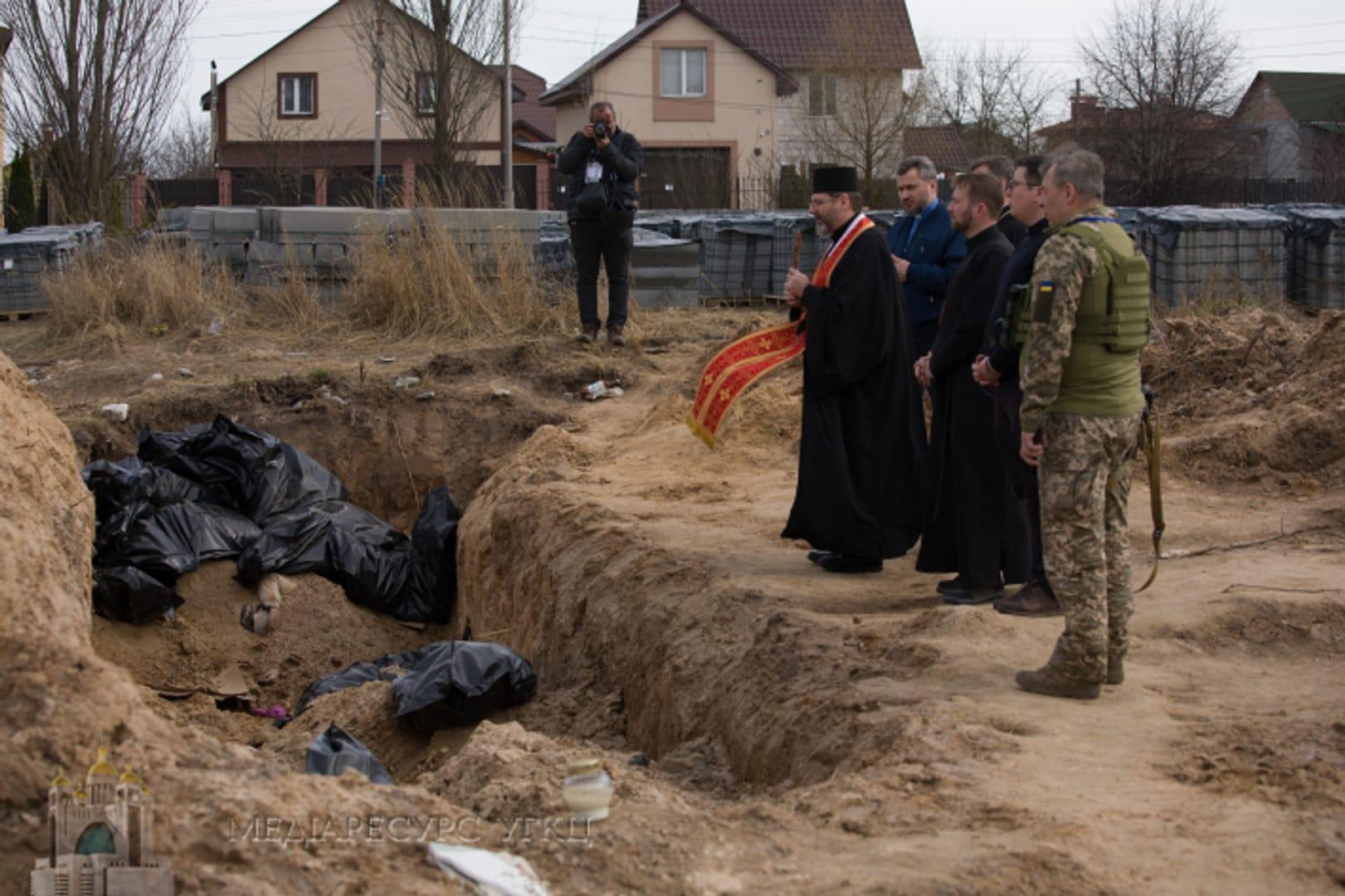ROME – Major Archbishop Sviatoslav Shevchuk, head of the Ukrainian Greek Catholic Church, visited several cities recently liberated from Russian occupation, including Bucha, where war crimes are believed to have been committed against civilians.
On April 7, Shevchuk also made stops in Gostomel and Irpin, according to the website for the Ukrainian Greek Catholic Church.
Standing before the mass grave in Bucha, Shevchuk said, “It’s very difficult to speak. Their blood calls from here, from this land, to heaven.”
“A good ear must hear the cry of that blood,” he said, noting that many of the dead are young people.
“It is clear that their lives were taken. We came here to pray for their eternal peace,” he said, saying it is important that not only Ukraine, but the whole world feels the pain experienced by those who suffered torture and death.
Shevchuk said that he is also praying for justice, because “if this sin is not condemned, if this crime is not exposed, it can be repeated.”
“Any of us could be in this mass grave,” he said. “May the Lord God rest the souls of his innocent slain servants, may he save lives, may he rid Ukraine of those criminals who came to kill, plunder, and destroy. Eternal memory of the innocent slain!”
In Irpin, Shevchuk visited the Greek Catholic Church of the Nativity of the Blessed Virgin, which was damaged by Russian troops during their occupation of the city. While there, he invoked the protection of the Mother of God.
Shevchuk’s visit comes days after reports emerged accusing Russian troops of war crimes during their occupation of Bucha. The Russian forces left the area on April 1.
According to photo and video images of the aftermath, citizens were shot with their hands tied behind their backs, or were gunned down while attempting to evacuate, delivering food, riding their bikes, or sheltering pets. There were also reports of rape, torture, and mutilated corpses.
The mayor of Bucha, Anatoliy Fedoruk, initially said more than 300 inhabitants of the city were found dead after Russia’s withdrawal, and the Ukrainian government has asked the International Criminal Court (ICC) to investigate the events that unfolded in Bucha as part of an ongoing investigation of Russia’s invasion of Ukraine to ascertain whether war crimes have been committed.
Shevchuk’s visit to Bucha, Irpin, and Gostomel came the same day the United Nations voted to suspend Russia from its Human Rights Council over the alleged human rights violations in Bucha and other Ukrainian towns.
The vote followed an impassioned speech by Ukrainian President Volodymyr Zelenskyy on Tuesday in which he urged the UN to punish Russia for war crimes.
Pope Francis Wednesday in his weekly general audience denounced the massacre in Bucha and said the United Nations and other international organizations have proven “impotent,” consumed by private interests rather than the pursuit of justice.
Heavy fighting is still happening throughout Ukraine, including in its eastern regions of Luhansk and Donesk, as well as the besieged city of Mariupol.
In a video message Friday, Shevchuk said Ukraine is still standing and fighting after 44 days of war, but the country is also “bleeding.”
“We see more and more that this war is, in fact, a war of total annihilation. We see how our occupiers, those who are capturing towns and villages, abuse the civilian population,” he said, noting that several evacuation sites, including train stations in eastern Ukraine, have been struck by Russian missiles.
There are also reports that Russian military has confiscated humanitarian cargo being transported to those in need, he said, saying, “Among all the horrors of war, every believing Christian asks themselves, ‘How do we live in a Christian way in such circumstances?’”
“We know that the main commandment of Christian life is the Commandment of Love. Love for God and for one’s neighbor. On these two commandments, says Christ, all the law and all the prophets are founded,” he said.
Shevchuk said he visited Bucha to see the tragedy with his own eyes, calling what happened in the city “an open wound on the body of Ukraine.”
“There, above the open mass grave, seeing the mutilated, breathless bodies, we prayed for their eternal rest. And in that prayer, I asked myself, I asked God, ‘God, what does it mean to love You and love one’s neighbor?’”
Looking down at the bodies buried in the mass grave, Shevchuk said he understood that “to love your neighbor means to feel related to him. It means feeling that we are human beings together, to belong to the same human race, and where he or she rests in the mass grave, I could have been laid to rest there as well.”
“We have a common vocation, a common fate,” he said. “We, as brothers and sisters in Christ, belong to the same human race. To love one’s neighbor means to be aware of and experience one’s humanity, and thus to show one’s humanity.”
Because of this, every Christian, he said, no matter where they live or to what nationality they belong, when they see the atrocities that happened in Bucha must say, “I am Ukrainian.”
“Feeling this unity in our human race with those innocent victims, the occupier is waging war against you and me, to put us in that mass grave tomorrow,” he said, and urged Christians to pray for the grace of learning to love one’s enemies.
To love one’s enemy in this case, he said, “means to stop his murderous hand, to take away his weapon, not to give him the opportunity to kill. We ask that in the circumstances of hatred and murder of war, that we know how to love God and our neighbor, that we remain human.”
Follow Elise Ann Allen on Twitter: @eliseannallen












